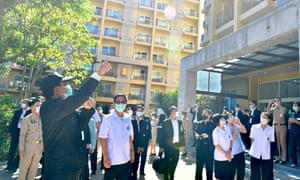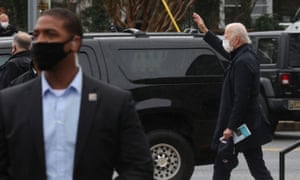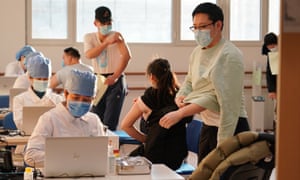UK becomes first country to administer Oxford-AstraZeneca vaccine
The UK has become the first country to administer the Oxford-AstraZeneca vaccine. NHS England tweeted on Monday that Brian Pinker, an 82-year-old dialysis patient, has become the first person to be given the jab, at Oxford University Hospital. The dose was administered by chief nurse Sam Foster.
“I am so pleased to be getting the COVID vaccine today and really proud that it is one that was invented in Oxford,” Pinker, a retired maintenance manager who has been having dialysis for kidney disease, said.
NHS England and NHS Improvement
(@NHSEngland)‘I’m so pleased to be getting the COVID vaccine today and really proud it is one that was invented in Oxford.’
82-year-old Brian Pinker became the first person in the world to receive the new Oxford AstraZeneca vaccine this morning at @OUHospitals. ? pic.twitter.com/nhnd3Sx97m
He said he was looking forward to celebrating his 48th wedding anniversary with wife Shirley in February.
“The nurses, doctors and staff today have all been brilliant,” he said.
The announcement came with Britain set to begin a mass rollout of the Oxford-AstraZeneca vaccine on Monday, with 530,000 doses ready for use. Health Secretary Matt Hancock said on Monday that 700 vaccination sites were open with the figure expected to pass 1,000 by the end of the week.
Boris Johnson said on Sunday that he expects tens of millions to be vaccinated within the next few months. 1m people have been vaccinated in the UK already after the Pfizer jab was approved in early December.
Updated
Russia on Monday reported 23,351 new coronavirus cases over the previous 24 hours, including 3,591 in Moscow, taking the national tally to 3,260,138.
Authorities said 482 people had died, taking Russia’s official death toll to 58,988.
There were 24,150 cases yesterday and 504 deaths. The number of cases continues a slight decline since record highs over Christmas.
Singapore will consider relaxing travel restrictions for people who have been vaccinated against COVID-19, the co-head of the government’s virus taskforce said on Monday.
The Southeast Asian travel hub has largely banned leisure travel, and has some limited business and official travel agreements with certain countries. Most returning residents have to isolate in designated hotels or at home for up to two weeks.
“There are several ongoing studies on the effectiveness of vaccines in reducing transmission risk, and we are monitoring these very carefully,” Lawrence Wong said in parliament.
“If there is clear evidence that transmission risks can be lowered significantly, we will certainly consider some relaxation to the SHN (stay home notice) regime for vaccinated travellers.”
This is Archie Bland picking up our live coronavirus coverage, and beginning in Thailand, where senior officials have said that the country will receive its first COVID-19 vaccines in February from China’s Sinovac Biotech and will have the capacity to produce 200 million doses a year locally of the AstraZeneca vaccine.
Thailand, which is aiming to inoculate at least half of its 70 million population, should take delivery of 200,000 doses of the Sinovac vaccine by February, Reuters reported Prime Minister Prayuth Chan-ocha as saying on Monday. It has ordered two million doses from Sinovac in total.
“I have given the direction on the vaccine and expect that within 1-2 months we will receive the first lot for medical professionals for about 200,000 doses,” Prayuth said, according to a Twitter posting by his office.
The Southeast Asian country reported its largest single-day increase in infections with 745 cases on Monday, with Prayuth urging people to stay home to limit the spread and avoid the need for a strict nationwide lockdown.
Another 800,000 doses of the Sinovac vaccine will arrive by March and one million in April, Supakit Sirilak, Director-General of Medical Science Department, said on Sunday.
Thailand in November signed an agreement for 26 million doses of the AstraZeneca vaccine, which will be produced by local firm, Siam Bioscience, with its first batch to be ready by May, Supakit said.
Hancock: ‘We don’t rule anything out’
The British government is not ruling out any further measure to try to curb the spread of coronavirus, including a national lockdown, the health secretary, Matt Hancock, said on Monday.
“It is a very difficult situation in terms of the growth of the virus,” Hancock said on Sky News.
Asked whether the government was considering imposing a new national lockdown, he answered: “We don’t rule anything out.”
Updated
UK restaurants and casual dining firms recorded almost 30,000 job losses in 2020 as the Covid-19 pandemic drove a 163% jump in redundancies.
Data compiled by the Centre for Retail Research (CRR) revealed that 29,684 jobs were lost across fine dining, independent businesses and large multiple casual-dining chains during the year.
It represents a sharp increase from 2019, when 11,280 job losses were reported across the sector, after firms were hit by two national lockdowns, local lockdown restrictions, curfews, changes to service rules and recently strengthened tier measures:

Helen Sullivan
That’s it from me, Helen Sullivan for today. Thanks for following along, and as always, you can say Hi on Twitter @helenrsullivan.
Here is my bit on what it has been like to run the pandemic liveblog for nearly a year – and what LA Confidential has to do with it:
Updated
Thai PM urges people to ‘just stay home’ as virus cases hit record
Thailand’s prime minister on Monday urged the public to stay home to help contain the country’s biggest coronavirus outbreak yet and avoid a strict lockdown, as authorities confirmed a daily record 745 new infections.
The government has declared 28 provinces, including Bangkok, as high-risk zones and asked people to work from home and avoid gathering or travel beyond their provinces, as infection numbers climb in the wake of outbreak first detected last month at a seafood market near the capital.

Thai prime minister Prayut Chan-o-cha (left) gestures as he talks to public health officials in Chonburi province last week. Photograph: Royal Thai Government/EPA
Prime minister Prayuth Chan-ocha said the government was mindful of the potential economic damage from strong containment measures. “We don’t want to lock down the entire country because we know what the problems are, therefore can you all lock down yourselves?” he told reporters.
“This is up to everyone, if we don’t want to get infected just stay home for 14 to 15 days, if you think like this then things will be safe, easier for screening,” Prayuth added.
Updated
Biden inauguration to feature virtual, nationwide parade
President-elect Joe Biden’s inauguration will include a “virtual parade across America” consistent with crowd limits during the coronavirus era, organizers announced Sunday, AP reports.
Following the swearing-in ceremony on Inauguration Day on 20 January on the west front of the US Capitol, Biden and his wife, first lady Jill Biden, will join the vice-president-elect, Kamala Harris, and her husband in participating in a socially distanced Pass in Review on the Capitol’s opposite front side. Those are military traditions where Biden will review the readiness of military troops.

US president-elect Biden attends a Sunday morning church service in Rehoboth Beach, Delaware. Photograph: Jonathan Ernst/Reuters
Biden will also receive a traditional presidential escort with representatives from every branch of the military from 15th Street in Washington to the White House. That, the presidential inaugural committee says, will be socially distanced too, while “providing the American people and world with historic images of the president-elect proceeding to the White House without attracting large crowds”.
Workers in recent days began dismantling an inaugural parade reviewing stand in front of the White House as Biden’s transition team continues to prepare for festivities that will be mostly virtual. Accordingly, organisers also said they will hold a virtual parade nationwide to “celebrate America’s heroes, highlight Americans from all walks of life in different states and regions, and reflect on the diversity, heritage, and resilience of the country as we begin a new American era”.
Updated
Summary
Here are the key developments from the last few hours:
- In England, parents face more disruption and uncertainty as local authorities across the country scramble to delay schools reopening in the face of rising coronavirus infection rates and the UK prime minister, Boris Johnson, admitted that more could be shut in the coming weeks.
- Japan’s prime minister, Yoshihide Suga, has said the government is considering declaring a state of emergency in the greater Tokyo region amid a sharp rise in coronavirus cases in and around the capital. Suga, whose handling of the pandemic has seen his approval ratings plummet in recent weeks, has come under pressure to take action to address the recent surge in infections.
- Britain will become the first country to roll out the low-cost and easily transportable AstraZeneca and Oxford University Covid vaccine on Monday. Six hospitals in England will administer the first of about 530,000 doses Britain has ready. The programme will be expanded to hundreds of other British sites in coming days and the government hopes it will deliver tens of millions of doses within months.
- Thousands of people were lining up in Beijing to receive a vaccine as China races to inoculate millions before the Chinese new year, which sparks a mass travel season in February. More than 73,000 people in the Chinese capital have received the first dose of the vaccine over the last couple of days, state media reported Sunday, including community workers and bus drivers.
- The US passed 350,000 coronavirus deaths – the highest toll in the world, amid several days of more than 2,500 deaths per day. The US also confirmed nearly 300,000 new cases in 24 hours on 2 January (the most recent available toll), according to the Johns Hopkins University tracker.
- India authorised two Covid-19 vaccines on Sunday, paving the way for a huge inoculation programme to stem the coronavirus pandemic in the world’s second most populous country. The country’s drugs regulator gave emergency authorization for the vaccine developed by Oxford University and UK-based drugmaker AstraZeneca, and another developed by the Indian company Bharat Biotech.
- New Zealand has further tightened border controls amid mounting anxiety about the new strain of coronavirus driving up infections overseas. Six cases of the new variant of the virus – five in arrivals from the UK and one from South Africa – were recorded in managed isolation facilities in the two weeks leading up to Christmas.
- South Korea expanded a ban on private gatherings larger than four people to the whole country, and extended unprecedented social distancing rules in greater Seoul as the number of daily cases bounced back to more than 1,000 in four days.
- Vietnam has agreed to buy 30m doses of the Covid-19 vaccine made by AstraZeneca Plc, the government said on Monday, adding that authorities are also seeking to purchase vaccines from other sources, including Pfizer Inc.
Updated
The number of confirmed coronavirus cases in Germany increased by 9,847 to 1,775,513, data from the Robert Koch Institute (RKI) for infectious diseases showed on Monday.
The reported death toll rose by 302 to 34,574, the tally showed.
Beijing vaccinates thousands in Covid-19 jab drive
Thousands of people were lining up in Beijing to receive a Covid-19 vaccine as China races to innoculate millions before the Chinese New Year mass travel season in February.
More than 73,000 people in the Chinese capital have received the first dose of the vaccine over the last couple of days, state media reported Sunday, including community workers and bus drivers.
Health authorities on New Year’s Eve granted “conditional” approval to a vaccine candidate made by Chinese pharma giant Sinopharm, which the company said had a 79% efficacy rate.
Footage from state broadcaster CCTV showed queues outside local hospitals and community health centres as people waited to read consent forms and have their temperatures taken before getting the jab.

People receive Covid vaccines at a healthcare center in Honglian Community in Xicheng District of Beijing, capital of China, 3 January 2021. Photograph: Xinhua/REX/Shutterstock
Health officials said gyms and empty factories were among centres being used for the vaccination programme.
China plans to vaccinate millions this winter in the run-up to Lunar New Year in mid-February.
Beijing has already administered around 4.5 million doses of largely unproven emergency vaccines this year – mostly to health workers and other state employees destined for overseas jobs, according to authorities.
But China now plans a gradual rollout for the vaccine starting with key groups considered to have a high risk of exposure to the virus, including port and logistic workers and people planning to return to studies abroad.







